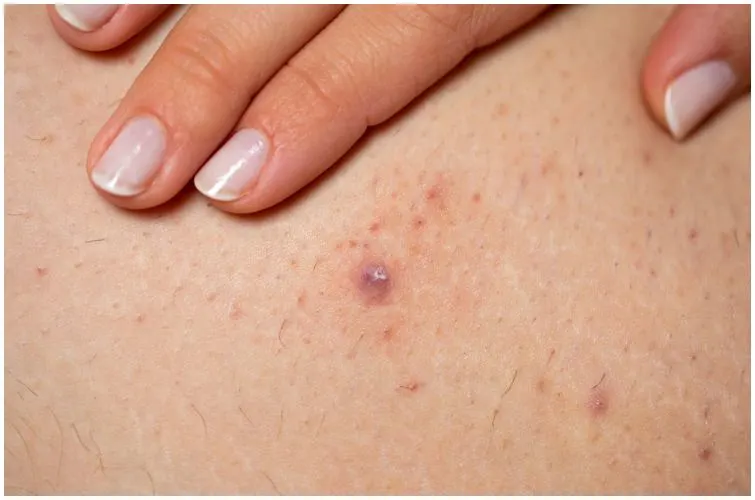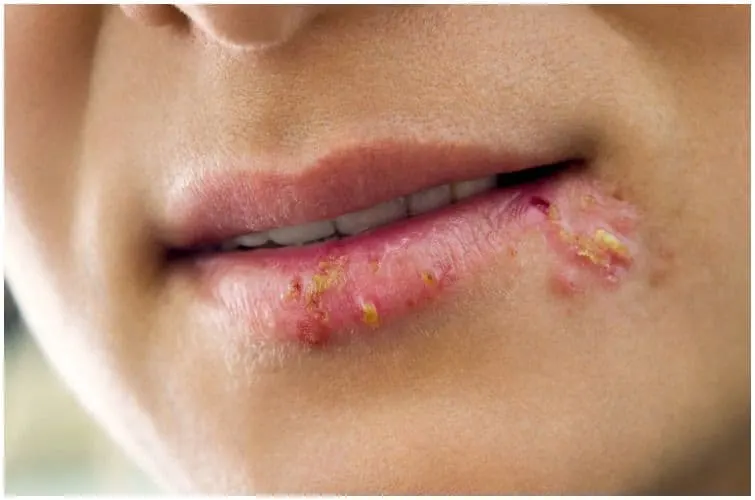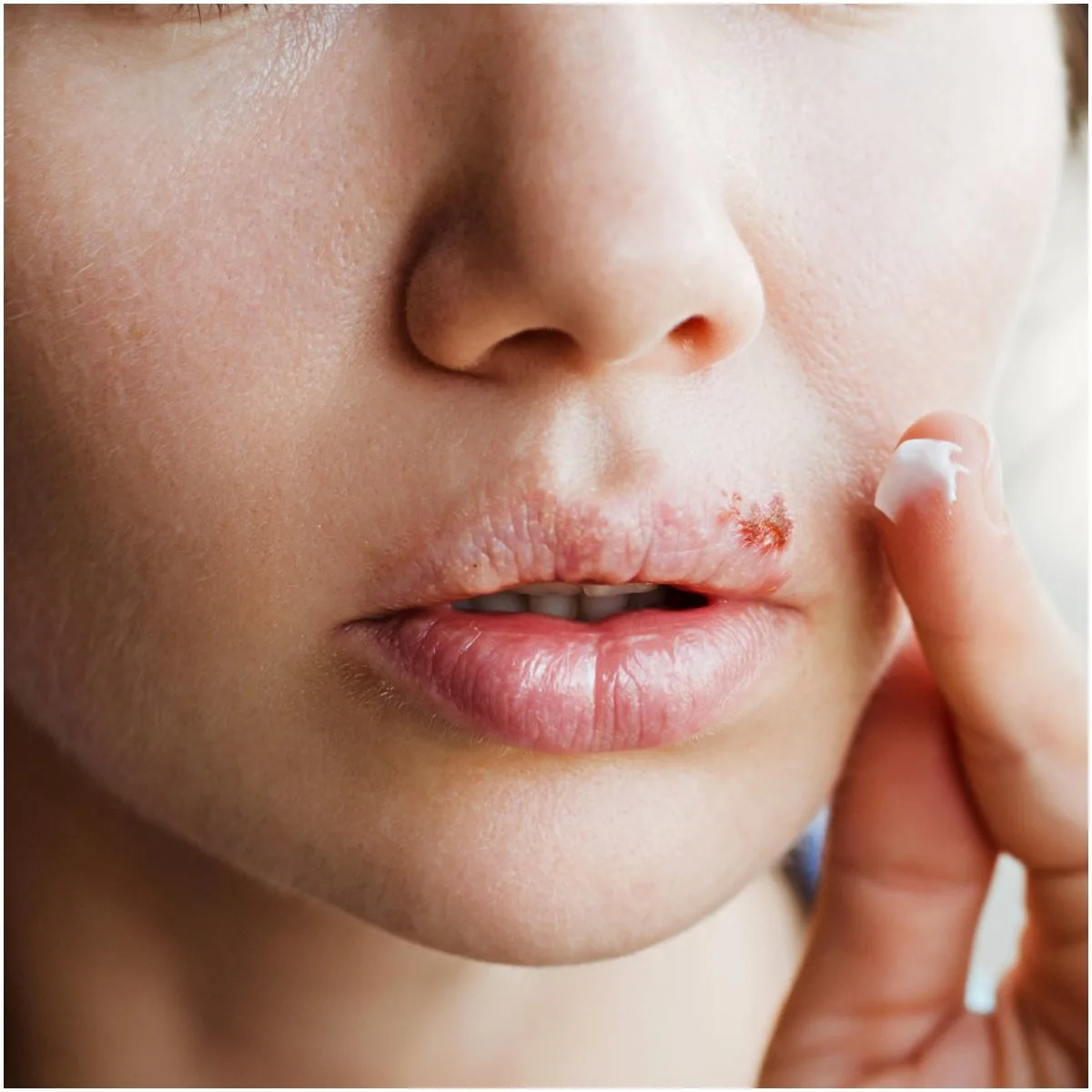This article reveals the differences between folliculitis and herpes:
Folliculitis
It is an infection or inflammation of one or more hair follicles (openings in the skin that enclose hair).
The condition can appear anywhere on the skin, except for your soles and palms. It is not harmful and will go away on its own.
Herpes
It is caused by the herpes simplex virus (HSV). As genital herpes can be passed through intimate sexual contact, it is also referred to as an STI (sexually transmitted infection).
An estimated 1 in 8 adults and teens in the United States have the genital herpes virus, whereas fifty percent of them are infected with the oral herpes virus.
Worldwide, over 150 million men and 267 million women are infected with HSV.
There are two types of HSV (HSV-1 and HSV-2) and in the last decade, both types have a decrease in prevalence.
Causes
Folliculitis is commonly caused by an infection (due to viruses, fungi, bacteria, or parasites), however, it may be the result of chemical injury or physical injury.
It can develop on any part of the body, however, it is most likely to occur on – the face, scalp, or parts of the armpits, arms, or legs.
Herpes is an infection caused by the herpes simplex virus. Most of the oral herpes infections are caused by herpes simplex virus-1, whereas most of the genital herpes infections are caused by herpes simplex virus-2.
Note – HSV type-1 or type-2 can occur in either the oral or genital area.
According to the American Academy of Dermatology, about 20% of sexually active American adults are infected with herpes simplex virus-2.
This virus can easily be passed on to someone else through the moist skin which lines the anus, mouth, and genitals.
Risk Factors
Folliculitis

Folliculitis
It is linked to:
- long-term use of some medications, especially steroid or antibiotics creams;
- shaving;
- being overweight or obese;
- tight hair braids;
- weakened immune system due to conditions, like – cancer or HIV;
- tight clothing;
- an infected cut or wound that allows the pathogenic bacteria to spread to nearby hair follicles;
- using an unclean swimming pool or hot tub;
- ingrown hairs;
- injuries to the skin, including insect bites or cuts;
- skin conditions, like – dermatitis or acne;
- covering the skin with non-breathable items, like – plastic or tape;
- skin-clogging substances, like – motor oil and tar;
- personal products or sweat which irritate the follicle;
- clothing that rubs the skin.
READ MORE: Essential Oils For Thyroid Nodules
Herpes

Herpes
The following factors can increase your risk of becoming infected with HSV:
- history of other sexually transmitted infections;
- having unprotected sex;
- HIV infection and other conditions which affect the immune system;
- becoming sexually active at a young age;
- age: 20-40;
- being a woman;
- engaging in male homosexual activity;
- having a partner who is infected with HSV;
- having had several sexual partners;
- having been sexually active for many years.
READ MORE: Essential Oils For Post Nasal Drip
Symptoms
Folliculitis
Signs and symptoms of folliculitis include:
- small red bumps;
- mild fever;
- white-headed pimples;
- swelling;
- pus-filled sores;
- pain;
- crusty sores;
- tenderness;
- burning;
- itching;
- inflamed skin;
- red skin.
READ MORE: Famous People With Tourette’s Syndrome
Herpes
Most people never develop any symptoms when they are infected with HSV.
When symptoms occur, they usually occur within 14 days after contracting HSV from an infected individual.
Common symptoms may include:
- a feeling of pressure in the area below the stomach;
- tingling, itching, or a burning feeling in the anal or vaginal area;
- difficult or painful urination;
- headache;
- a change in vaginal discharge;
- pain in the buttocks, legs, or vaginal area;
- swollen glands;
- flu-like symptoms, including fever.
After several days, painful blisters, sores, or ulcers may develop where HSV entered the body. These areas are:
- on the thighs or buttocks;
- the anal or vaginal area;
- in the urinary tract;
- on the cervix;
- inside the vagina;
- the mouth;
- on other parts of the body where HSV has entered.
READ MORE: Essential Oils For Bipolar Disorder
Complications
Folliculitis
Although this condition is not life-threatening, some complications may occur, such as:
- cellulitis – infection of the skin;
- infections that spread to other areas;
- recurrent follicle infections which may result in scarring;
- permanent hair loss due to follicle damage;
- furunculosis – boils under the skin.
Herpes
- disseminated herpes;
- ocular herpes (an infection of the eye by the herpes simplex virus);
- hearing loss;
- meningitis (inflammation of the membranes surrounding the brain and spinal cord);
- encephalitis.
READ MORE: Essential Oils For Lichen Sclerosus
Treatment
To treat folliculitis which is slow to heal or severe, your healthcare provider may recommend:
- antihistamines or NSAIDs to relieve itching or pain;
- keeping the affected area exposed to the fresh air may help;
- do not shave and wear comfortable clothes to reduce the chances of skin friction;
- topical or oral antifungal or antibiotics to treat the cause of the infection.
Regarding herpes, there’s no cure for it. But, symptoms usually clear up by themselves. Blisters can come back.
For this, antiviral medicines may help shorten an outbreak by up to 2 days, but only if you start taking it as soon as symptoms appear.
In addition, you can help ease the pain by:
- taking a pain reliever, such as – ibuprofen (Advil), aspirin, or acetaminophen (Tylenol);
- taking a warm bath;
- putting an ice pack on the sores;
- wearing soft, loose clothes;
- keeping your genital area dry.
Prognosis
Nearly all cases of folliculitis will resolve or respond to therapy.
However, people with a low immune system have increased chances of experiencing complications.
The prognosis of herpes is variable since there is no cure. In addition, recurrent outbreaks may vary in severity and frequency.
READ MORE: Gastritis vs Gastroenteritis – Differences
Folliculitis vs Herpes On Pubic Area – Differences
Folliculitis represents a deep or superficial inflammation of the hair follicle. It starts out as clusters of small white-headed pimples surrounding hair follicles that can turn into crusty sores.
It is quite common, and anyone can get this skin problem.
The condition can occur on the skin wherever hair grows, including the scalp.
It is most likely to occur on the buttocks, neck, thighs, and armpits.
While many things can damage your hair follicles, the following are frequent causes of this inflammation:
- weight gain;
- hot tub (improperly maintained) use;
- medications you take;
- medications applied to the skin, like – coal tar;
- tight equipment or clothing;
- plucking, shaving, or waxing.
Herpes is a common and usually recurrent skin condition that is caused by the herpes simplex virus.
There are two types of HSV:
- herpes simplex virus-1 is most commonly linked with ulcers and blisters around the mouth known as cold sores;
- herpes simplex virus-2 is linked with blistering lesions in genital areas that are exposed during sexual contact.
Genital herpes is usually transmitted by having sex with an infected partner.
Using condoms reduces the risk of passing on the HSV, however, it doesn’t entirely eliminate it.
In females, herpes sores or blisters can appear on the:
- buttocks and around the anus;
- labia (part of female external genitalia);
- groin, thighs;
- inside the vagina.
In males, genital herpes sores can appear inside or on the:
- penis;
- around the anus;
- buttocks;
- groin and thighs;
- scrotum.
Conclusion
Though both conditions can cause redness, itching, and pain, there are several key differences between them.
Folliculitis is often caused by an infection or irritation of the hair follicles, while herpes is caused by the herpes simplex virus.
Herpes outbreaks typically occur in clusters of blister-like lesions, while folliculitis typically appears as small bumps or pimples. In addition, herpes lesions usually heal within two to four weeks, while folliculitis lesions may take several weeks to resolve.
While both conditions can be uncomfortable, it is important to seek medical treatment if you suspect you have herpes, as the virus can be transmitted through contact with open sores. A healthcare professional can provide an accurate diagnosis and appropriate treatment plan, ensuring the best possible outcome for your health.
Images credit – Shutterstock
READ THIS NEXT: Essential Oils For Laryngitis
Sources https://www.sciencedirect.com/topics/medicine-and-dentistry/folliculitis https://www.ncbi.nlm.nih.gov/pubmed/640102 https://www.ncbi.nlm.nih.gov/pmc/articles/PMC385996/ https://sti.bmj.com/content/79/4/286
